
BY TYLER CHOI AND BRADLEY NORTHCOTE
Academic research sometimes gets a bad rap for being boring and irrelevant to daily life, but an eye-catching research paper with contributions from a Sheridan professor may change opinions. On the Reception and Detection of Pseudo-profound Bullshit, a research paper released in November 2015 with contributions from Nathaniel Barr, a Sheridan Professor of Creativity and Creative Thinking, offers serious information in contrast to a light-hearted title.
Now a shared winner of the prestigious, yet very tongue-in-cheek, Ig Nobel Peace Prize, Barr, who taught at Davis Campus in Brampton and is currently on paternity leave and on a media tour discussing the paper, believes the proliferation of “bullshit” in the public is a serious concern. By accepting “bullshit”, Barr says, “We’re risking people’s lives and their bank accounts.”
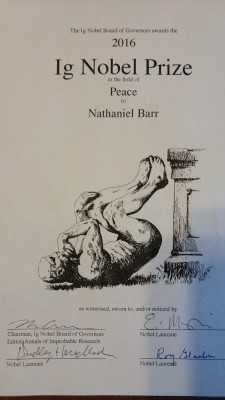
Barr and his colleagues drew their conclusion from extensive research, including four studies in which subjects responded to a battery of, “bullshit statements consisting of buzzwords randomly organized into statements with syntactic structure but no discernible meaning (e.g., “Wholeness quiets infinite phenomena”), or sentence generators like New Age Bullshit Generator. Afterwards, the researchers created a profile of the subject to uncover their motivations and thought processes. They discovered correlations between receptiveness to the “bullshit statements” and reliance on analytical rather than critical thinking.
“One of the things was a disposition to think analytically,” said Barr. “They thought [the statements were] powerful, but they didn’t take the time to think critically. They weren’t considering the source or the content.”
His team found acceptance of “bullshit statements” also correlated with higher rates of paranormal and religious belief, and a diminished inclination to be intuitive and intelligent.
Feedback has been mostly positive from the scientific community, with attention from famed biologist Richard Dawkins and the Journal of Hypertension. But like all science, naysayers popped up to dispute the paper. Deepak Chopra tweeted, “I did see this amusing article from Poppycock. Do check its critiques. The article is #bullshit.” Barr also says some have called the research, “close-minded”.
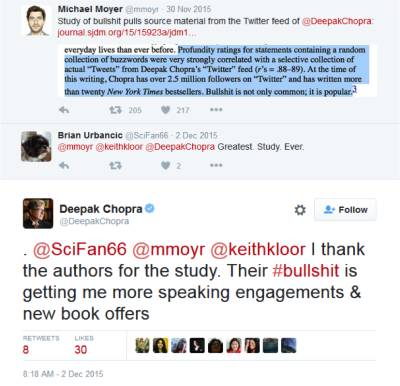
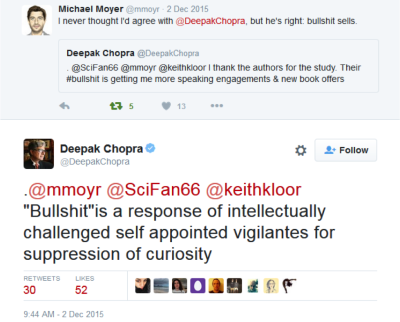
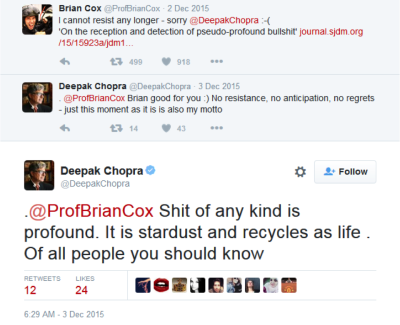
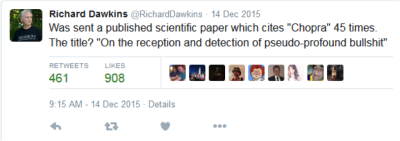
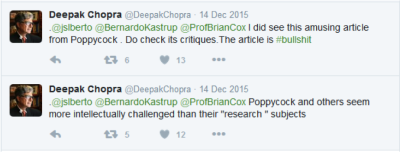
But what truly concerns Barr is how bullshit permeates public discourse, something he outlines by saying, “We wanted to start a conversation on bullshit.” Easy talking points for him are unscientific claims about vaccines and climate change denial, which he considers vital to discuss.
“What does medical science have to gain from lying? Do they really sell books?” Barr wonders. He says the medical field is one of many where people must weed out bullshit, due to its public health impacts. Stories like that of Andrew Wakefield, a medical researcher who fabricated studies suggesting a connection between autism and vaccination. The surprisingly high rates of acceptance to Wakefield’s now discredited theories and connections to re-emergence of previously silenced diseases show the importance of Barr’s paper.
“Knowing the intentions of the bullshit can go a long way to discovering the ‘bullshitee’,” says Barr.
He believes the most important step scientists and researchers can take to tackle bullshit is being fun and entertaining, something he hopes he achieved with his paper. “The bullshitters are already interesting and wealthy enough,” Barr says, referencing New Age guru Deepak Chopra’s net worth in the tens of millions and the popularity of his books.
Why People Are Confused About What Experts Really Think – The New York Times
Why bullshit is no laughing matter – Aeon
Most of the information we spread online is quantifiably “bullshit” – Quartz
As for the media, Barr says their role should be allowing scientists to tell their own stories directly. The tendency for news of today to rely on clickbait is worrisome, as are the shortening article lengths which dilute the message, he adds.
Barr is now looking for avenues to take the paper to the next step. In the future, perhaps another Ig Nobel Prize, or its more respected cousin is in the wings for his team in the days to come.
https://www.youtube.com/watch?v=n8PejoXOaF0&feature=youtu.be
